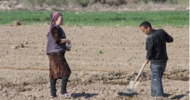Amid some misgivings about India’s acquisition of vast stretches of land, Ethiopian Prime Minister Meles Zenawi Wednesday rejected charges of land grab as “loose talk” and welcomed Indian investment for development.
News of the deal has aroused very vehement protest from the Sudanese Farmer’s Union and the tenants in the Gezira Scheme.
- Sudan Tribune
-
19 December 2010
The global rush to acquire agricultural land in bountiful Africa evokes concern and protests.
Runaway farmland and borderland giveaway deals need to be publicly scrutinized to ensure transparency (detect corruption and criminality) and to make certain that private interests (sweetheart deals) have not overtaken the public interest, or secret deals are not made to harm the Ethiopian national interest.
- Huffington Post
-
15 February 2010
Reports indicate the growing Euro-Arab-Asian interest to buy land in Africa for the food security of their home population, not Africa´s. However, seldom do these reports link the the appetite for farmland and energy investment on the continent with the current global economic crises.
- American Chronicle
-
26 February 2009
Indian companies are among the biggest land holders in the African country through deals concluded in dubious circumstances
- The Hindu
-
19 February 2013
Large-scale agricultural in the developing world have received significant attention in recent months and years. This articles looks at the dynamics of the Ethiopian context and policy recommendations in moving forward.
- Logan Cochrane
-
01 October 2012
Women, who are already compensating for rising food prices and energy costs with additional time and labor, are now further disadvantaged through land grabbing.
- TrustLaw
-
16 February 2012
The 19th century had the Great Scramble for Africa, when developed nations raced for several decades to lay claim to new territories and their riches. This century may yet be known as the Great Selloff of Africa.
- Toronto Star
-
03 December 2011
The following report, by independent researcher Anna Bolin, explores the global trends and influences at work behind agriculture mega-projects like MIFEE in Papua.
- Down to Earth
-
30 November 2011
It is true that many of the land deals are not structured to benefit local communities but it is wrong to claim that such investments will only help promote food exports at the expense of local needs, says Calestous Juma.
- Daily Nation
-
14 June 2011
Many small Ethopian farmers do not share their leaders' enthusiasm for leasing off farmland to foreign investors
2017 went down as one of the deadliest years ever for land defenders. It was also a pretty bad year for several land grabbers.
Activists tracking these deals say rich countries are buying up land—93 million acres—and displacing local people and wildlife.
Many Punjab farmers who went to Africa and Georgia in search of greener pastures are returning home
- Business Standard
-
30 May 2015
Ethiopian prime minister Hailemariam Dessalegn has denied that the government is forcing tens of thousands of people off their land in order to lease it to foreign investors.
- Sudan Tribune
-
21 April 2013
If there is “blood diamond”, there is also such a thing as “blood maize”, “blood soya” and “blood pulses”.
- Business Standard
-
16 February 2013
"Africa will be more food insecure if these investments go to other parts of the world and Africa has to turn to those places to buy food," according to Dr Ousmane Badiane of IFPRI
- This is Africa
-
02 July 2012
Multinational corporations are buying enormous tracts of land in Africa, putting countries on the path to increased food insecurity, environmental degradation, increased reliance on aid and marginalisation of farming and pastoralist communities.
- Pambazuka
-
03 November 2011
I don't know why the Africa leaders are so blind that they can't see the threat farmland grabs pose for their national sovereignty.
- Ground Reality
-
04 February 2011
US government mission in Riyadh writes, "Although the idea of Saudi farms in
Africa may sound farfetched, the Kingdom has for years hired foreign managers and laborers to administer its farms and other agribusinesses (e.g., most Saudi wheat farms currently have Egyptian managers)."
- Wikileaks
-
24 January 2010
Ramakrishna Karuturi does not feature on any international power list. Perhaps he should.
- Times of India
-
26 September 2009
After food costs spike, Saudis spent billions buying up farm land around the world. Who benefits exactly and can the spree continue?
- Middle East Eye
-
05 October 2016
Saudi Star Agricultural Development PLC is reported to have donated 26 tractors and 30M Birr to Gambella regional state local farmers and youth, where it has acquired a 60-year concession for 10,000 ha.
- Gambella Media
-
13 June 2015
The host country government of the international conference is arguably one of the worst offenders when it comes to forced displacement resulting from land grabs.
- Oakland Institue
-
12 November 2014
Interview with Sai Ramakrishna Karuturi, chairman and managing director Karuturi Global Limited.
- Millenium Post
-
28 April 2014
Nyikaw Ochalla outlines the disparaging treatment towards locals in Gambela as he highlights government as well as Karuturi’s complacency towards the displaced locals.
- Millennium Post
-
28 April 2014
DFID documents reveal that, despite denials of funding forced relocations, British cash pays salaries of officials implementing the Ethiopian government's 'villagisation' programme.
Karuturi Global Limited, société holding de droit indien et dont le siège est situé à Bangalore, peut se retrouver sous la loupe de l'administration fiscale du Kenya pour fraude fiscale, mais les plaintes déposées contre elle vont plus loin.
India is one of Africa’s biggest investors in agricultural land.















